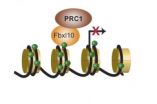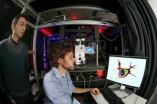(Press-News.org) (SACRAMENTO, Calif.) — Scientists have long puzzled over why "bad" bacteria such as E. coli can thrive in the guts of those with inflammatory bowel disease (IBD), causing serious diarrhea. Now UC Davis researchers have discovered the answer—one that may be the first step toward finding new and better treatments for IBD.
The researchers discovered a biological mechanism by which harmful bacteria grow, edge out beneficial bacteria and damage the gut in IBD. This new understanding, published in the Feb. 8 issue of Science, may help researchers develop new treatments for IBD with fewer side effects than current therapies.
IBD begins when "good" bacteria are mistakenly killed by the immune system, while harmful bacteria multiply — resulting in inflammation and damage to the intestines, and chronic episodes of abdominal pain, cramping, diarrhea and other changes in bowel habits. It's estimated that IBD, which includes ulcerative colitis and Crohn's disease, affects 1.4 million people in the U.S., according to the Centers for Disease Control and Prevention.
In test-tube and animal studies, the researchers found that potentially harmful bacteria in the intestine called Enterobacteriaceae use nitrate — a byproduct formed during the intestinal inflammation in IBD — to grow and thrive. Enterobacteriaceae strains include certain E. coli bacteria, which can worsen the intestinal damage of IBD. Eventually, the intestines of those with IBD become overrun by harmful bacteria, and the numbers of normal good bacteria in the gut decrease.
"Much like humans use oxygen, E. coli can use nitrate as a replacement for oxygen to respire, produce energy and grow," said lead author Andreas Baumler, a professor of medical microbiology and immunology at UC Davis.
"In IBD, nitrate produced by inflammation in the gut allows E. coli to take a deep 'breath,' and beat out our beneficial microbes in the competition for nutrients," he said.
The inflammation in the intestines of those with IBD leads to the release of nitric oxide radicals that are powerful in attacking bacteria, Baumler explained. Yet these nitric oxide radicals are also very unstable, and eventually decompose into nitrate, which can be used by bacteria like E. coli to thrive and grow. By contrast, good bacteria in the gut grows through fermentation — a much slower process.
Determining the reasons why bacteria like E. coli can edge out good bacteria in the gut is crucial for determining new ways to halt the IBD disease process, according to Baumler. Current treatments for IBD suppress the immune response through antibiotics, corticosteroids or other powerful immune-modifying drugs. But long-term side effects can limit their use and their effectiveness for IBD patients.
The UC Davis team's research indicates that targeting the molecular pathways that generate nitric oxide and nitrate, as well as other molecules that feed harmful gut bacteria, could calm down and normalize the intestinal environment in IBD, Baumler noted. They are already doing research with one candidate drug that could halt the multiple pathways by which harmful bacteria thrive in IBD.
"The idea would be to inhibit all pathways that produce molecules that can be used by bacteria such as E. coli for respiration and growth," Baumler said. "Essentially you could then smother the bacteria."
INFORMATION:
Other study authors include Sebastian E. Winter, Maria G. Winter, Mariana N. Xavier, Parameth Thiennimitr, Victor Poon, A. Marijke Keestra, Ina Popova, Sanjai J. Parikh, Renee M. Tsolis, and Valley J. Stewart of UC Davis; and Richard C. Laughlin, Gabriel Gomez, Jing Wu, Sara D. Lawhon, and L. Garry Adams of Texas A&M University.
This work was supported by the California Agricultural Experiment Station and Public Health Service grants AI089078, AI076246 and AI088122 along with a scholarship from the Faculty of Medicine, Chiang Mai University, Thailand.
About UC Davis Health System
UC Davis Health System is improving lives and transforming health care by providing excellent patient care, conducting groundbreaking research, fostering inter-professional education, and creating innovative partnerships with the community. The academic health system includes one of the country's best medical schools, a 619-bed acute-care teaching hospital, an 800-member physician's practice group and the new Betty Irene Moore School of Nursing. It is home to a National Cancer Institute-designated comprehensive cancer center, an international neurodevelopmental institute, a stem cell institute and a comprehensive children's hospital. Other nationally prominent centers focus on advancing telemedicine, improving vascular care, eliminating health disparities and translating research findings into new treatments for patients. Together, they make UC Davis a hub of innovation that is transforming health for all. For more information, visit http://healthsystem.ucdavis.edu.
END
Jacob Rutt is a bright 11-year-old who likes to draw detailed maps in his spare time. But the budding geographer has a hard time with physical skills most children take for granted -- running and climbing trees are beyond him, and even walking can be difficult. He was diagnosed with a form of muscular dystrophy known as Duchenne when he was two years old.
The disease affects about 1 in 3,500 newborns -- mostly boys -- worldwide. It usually becomes apparent in early childhood, as weakened skeletal muscles cause delays in milestones such as sitting and walking. Children ...
A single embryonic stem cell can develop into more than 200 specialized cell types that make up our body. This maturation process is called differentiation and is tightly regulated. If the regulation is lost, specialized cells cannot develop correctly during development. In adulthood, the specialized cells may forget their identity and develop into cancer cells. Research from BRIC, University of Copenhagen, has identified a crucial role of the molecule Fbxl10 in differentiation of embryonic stem cells and suggests the molecule as a new potential target for cancer therapy.
"Our ...
Highlights of this news release:
Six-month study finds that progestin-releasing contraceptives show a slight negative impact on metabolic markers, raising the risk for type 2 diabetes.
Contraceptive implants under the skin increase the risk more than uterine implants.
Longer and larger studies are needed to see if metabolic changes are temporary or long-term.
LOS ANGELES – A first-of-its-kind study by researchers at the Keck School of Medicine of the University of Southern California (USC) indicates that healthy, obese, reproductive-age women who use long-acting ...
Fishing communities living on the islands of Indonesia's Karimunjawa National Park have found an important balance, improving their social well-being while reducing their reliance on marine biodiversity, according to the Wildlife Conservation Society and the University of Western Australia.
Over the past 5 years, the Government of Indonesia has turned Karimunjawa National Park—a marine paradise of turquoise seas and mangrove-ringed islands in the Java Sea just south of Borneo—into a model of co-management for the country, largely by increasing community participation ...
ARGONNE, Ill. – Although scientists have been aware that magnetism and electricity are two sides of the same proverbial coin for almost 150 years, researchers are still trying to find new ways to use a material's electric behavior to influence its magnetic behavior, or vice versa.
Thanks to new research by an international team of researchers led by the U.S. Department of Energy's Argonne National Laboratory, physicists have developed new methods for controlling magnetic order in a particular class of materials known as "magnetoelectrics."
Magnetoelectrics get their ...
Triple-negative breast cancer is an aggressive form of breast cancer that has few treatment options;
This large-scale study shows that abnormal levels of small molecules called microRNA can be used to classify this malignancy into four subtypes;
The findings could lead to new ways to identify the best therapy for individual patients and to more effective therapies in the future.
COLUMBUS, Ohio – A new, large-scale study of triple-negative breast cancer shows that small molecules called microRNA can be used to define four subtypes of this aggressive malignancy.
The ...
In the world of microscopy, this advance is almost comparable to the leap from photography to live television. Two young EPFL researchers, Yann Cotte and Fatih Toy, have designed a device that combines holographic microscopy and computational image processing to observe living biological tissues at the nanoscale. Their research is being done under the supervision of Christian Depeursinge, head of the Microvision and Microdiagnostics Group in EPFL's School of Engineering.
Using their setup, three-dimensional images of living cells can be obtained in just a few minutes ...
WASHINGTON –Requiring individuals to pay a premium for public health insurance coverage can counteract the coverage effects of expanding eligibility for public health insurance programs to higher income families.
That is the finding of a study by a team of researchers from Georgetown University School of Nursing & Health Studies (NHS), University of California at Los Angeles (UCLA), and Columbia University published today in the journal Health Services Research.
"Our findings speak to the importance of not just the availability of insurance coverage, but also the ...
Bronchiectasis is independently associated with an increased mortality risk in patients with moderate-to-severe COPD, according to a new study from researchers in Spain.
Bronchiectasis, a permanent and progressive dilation of the lung's airways, is common in COPD patients and is associated with longer and more intense exacerbations, more frequent bacterial colonization of the bronchial mucosa, and a greater degree of functional impairment.
"As COPD patients with bronchiectasis have an increased incidence of other known prognostic factors, we hypothesized that bronchiectasis ...
Researchers at the University of Rochester showed last year how Twitter can be used to predict how likely it is for a Twitter user to become sick. They have now used Twitter to model how other factors – social status, exposure to pollution, interpersonal interaction and others – influence health.
"If you want to know, down to the individual level, how many people are sick in a population, you would have to survey the population, which is costly and time-consuming," said Adam Sadilek, postdoctoral researcher at the University of Rochester. "Twitter and the technology we ...


